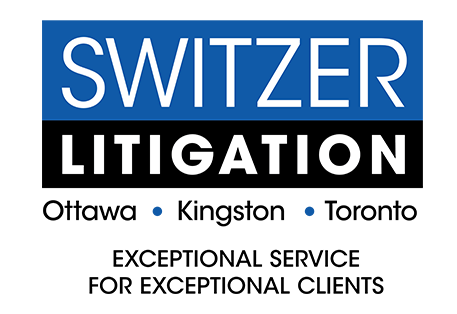Switzer Litigation and Autism Awareness
Switzer Litigation seeks to increase public awareness about Autism Spectrum Disorder. Being aware includes understanding what Autism Spectrum Disorder is, how it affects the day to day lives of those in our community that suffer from this disorder, advocating for appropriate services for individuals of every age, and providing the latest information regarding treatment, education, research, and advocacy.
What is Autism?
Autism spectrum disorder (ASD) is a complex developmental disability; signs typically appear during early childhood and affect a person’s ability to communicate, and interact with others. ASD is defined by a certain set of behaviours and is a “spectrum condition” that affects individuals differently and to varying degrees. There is no known single cause of ASD, but increased awareness and early diagnosis/intervention and access to appropriate services/supports lead to significantly improved outcomes. Some of the behaviours associated with ASD include delayed learning of language; difficulty making eye contact or holding a conversation; difficulty with executive functioning, which relates to reasoning and planning; narrow, intense interests; poor motor skills’ and sensory sensitivities. A person on the spectrum might follow many of these behaviours or just a few, or many others besides. The diagnosis of ASD is applied based on analysis of all behaviours and their severity.
In 2016, the Centers for Disease Control and Prevention reported that the prevalence of ASD had risen to 1 in every 68 births in the United States – nearly twice as great as the 2004 rate of 1 in 125 – and almost 1 in 54 boys. The spotlight shining on autism as a result has opened opportunities for the nation to consider how to serve families facing a lifetime of supports for their children. In June 2014, researchers estimated the lifetime cost of caring for a child with autism is as great as $2.4 million.
Knowing the signs: Early identification can change lives
ASD is treatable. Children do not “outgrow” ASD, but studies show that early diagnosis and intervention lead to significantly improved outcomes.
Here are some signs to look for in the children of your life:
• Lack of or delay in spoken language
• Repetitive use of language and/or motor mannerisms (e.g., hand-flapping, twirling objects)
• Little or no eye contact
• Lack of interest in peer relationships
• Lack of spontaneous or make-believe play
• Persistent fixation on parts of objects
What are the symptoms of Autism?
The characteristic behaviours of ASD may be apparent in infancy (18 to 24 months), but they usually become clearer during early childhood (24 months to 6 years).
As part of a well-baby or well-child visit, your child’s doctor should perform a “developmental screening,” asking specific questions about your baby’s progress. Five behaviours that warrant further evaluation:
• Does not babble or coo by 12 months
• Does not gesture (point, wave, grasp) by 12 months
• Does not say single words by 16 months
• Does not say two-word phrases on his or her own by 24 months
• Has any loss of any language or social skill at any age
Any of these five “red flags” does not mean your child has ASD. But because the disorder’s symptoms vary so widely, a child showing these behaviors should be evaluated by a multidisciplinary team. This team might include a neurologist, psychologist, developmental pediatrician, speech/language therapist, learning consultant or other professionals who are knowledgeable about autism.
How is Autism diagnosed?
When parents or support providers become concerned that their child is not following a typical developmental course, they turn to experts, including psychologists, educators and medical professionals, for a diagnosis.
At first glance, some people with autism may appear to have an intellectual disability, sensory processing issues, or problems with hearing or vision. To complicate matters further, these conditions can co-occur with ASD. However, it is important to distinguish autism from other conditions, as an accurate and early autism diagnosis can provide the basis for an appropriate educational and treatment program.
Other medical conditions or syndromes, such as sensory processing disorder, can present symptoms that are confusingly similar to ASD. This is known as differential diagnosis.
There are many differences between a medical diagnosis and an educational determination, or school evaluation, of a disability. A medical diagnosis is made by a physician based on an assessment of symptoms and diagnostic tests . A medical diagnosis of autism spectrum disorder, for instance, is most frequently made by a physician according to the Diagnostic and Statistical Manual (DSM-5, released 2013) of the American Psychological Association . This manual guides physicians in diagnosing autism spectrum disorder according to a specific number of symptoms.
A brief observation in a single setting cannot present a true picture of someone’s abilities and behaviours. The person’s developmental history and input from parents, caregivers and/or teachers are important components of an accurate diagnosis.
An educational determination is made by a multidisciplinary evaluation team of various school professionals. The evaluation results are reviewed by a team of qualified professionals and the parents to determine whether a student qualifies for special education and related services.
What causes Autism?
There is no known single cause for ASD, but it is generally accepted that it is caused by abnormalities in brain structure or function. Brain scans show differences in the shape and structure of the brain in children with ASD compared to in neurotypical children. Researchers do not know the exact cause of ASD but are investigating a number of theories, including the links among heredity, genetics and medical problems.
In many families, there appears to be a pattern of ASD or related disabilities, further supporting the theory that the disorder has a genetic basis. While no one gene has been identified as causing ASD, researchers are searching for irregular segments of genetic code that children with autism may have inherited. It also appears that some children are born with a susceptibility to autism, but researchers have not yet identified a single “trigger” that causes autism to develop.
Other researchers are investigating the possibility that under certain conditions, a cluster of unstable genes may interfere with brain development, resulting in autism. Still other researchers are investigating problems during pregnancy or delivery as well as environmental factors such as viral infections, metabolic imbalances and exposure to chemicals.
Genetic Vulnerability
Autism tends to occur more frequently than expected among individuals who have certain medical conditions, including fragile X syndrome, tuberous sclerosis, congenital rubella syndrome and untreated phenylketonuria (PKU). Some harmful substances ingested during pregnancy also have been associated with an increased risk of autism.
Switzer Litigation and Autism Awareness
Switzer Litigation and its professionals participate in local events in eastern Ontario to promote autism awareness.
There here are many ways to get involved in the autism community. Switzer Litigation encourages everyone to keep current on and active in ongoing advocacy issues regarding autism, stay abreast of the latest in autism-related news and issues, and make an effort to attend autism events and conferences in our community. The benefits of being involved in the autism community are many - not the least of which is educating yourself about the most appropriate treatments and resources available to help your loved one on the spectrum.
April is Autism Awareness Month. The identification of April as the month for Autism Awareness is part of an effort to promote autism awareness, inclusion and self-determination for all, and assure that each person with ASD is provided the opportunity to achieve the highest possible quality of life.
Seek to ensure acceptance and inclusion in schools and communities that results in true appreciation of the unique aspects of all people. We want to get one step closer to a society where those with ASDs are truly valued for their unique talents and gifts.
Join us in celebration of National Autism Awareness Month. National Autism Awareness Month represents an excellent opportunity to promote autism awareness, autism acceptance and to draw attention to the tens of thousands facing an autism diagnosis each year.



